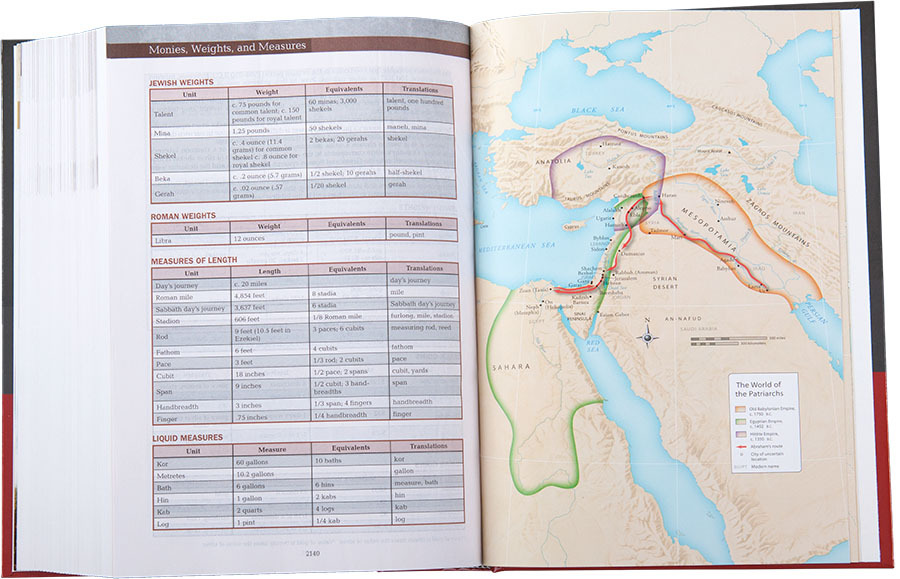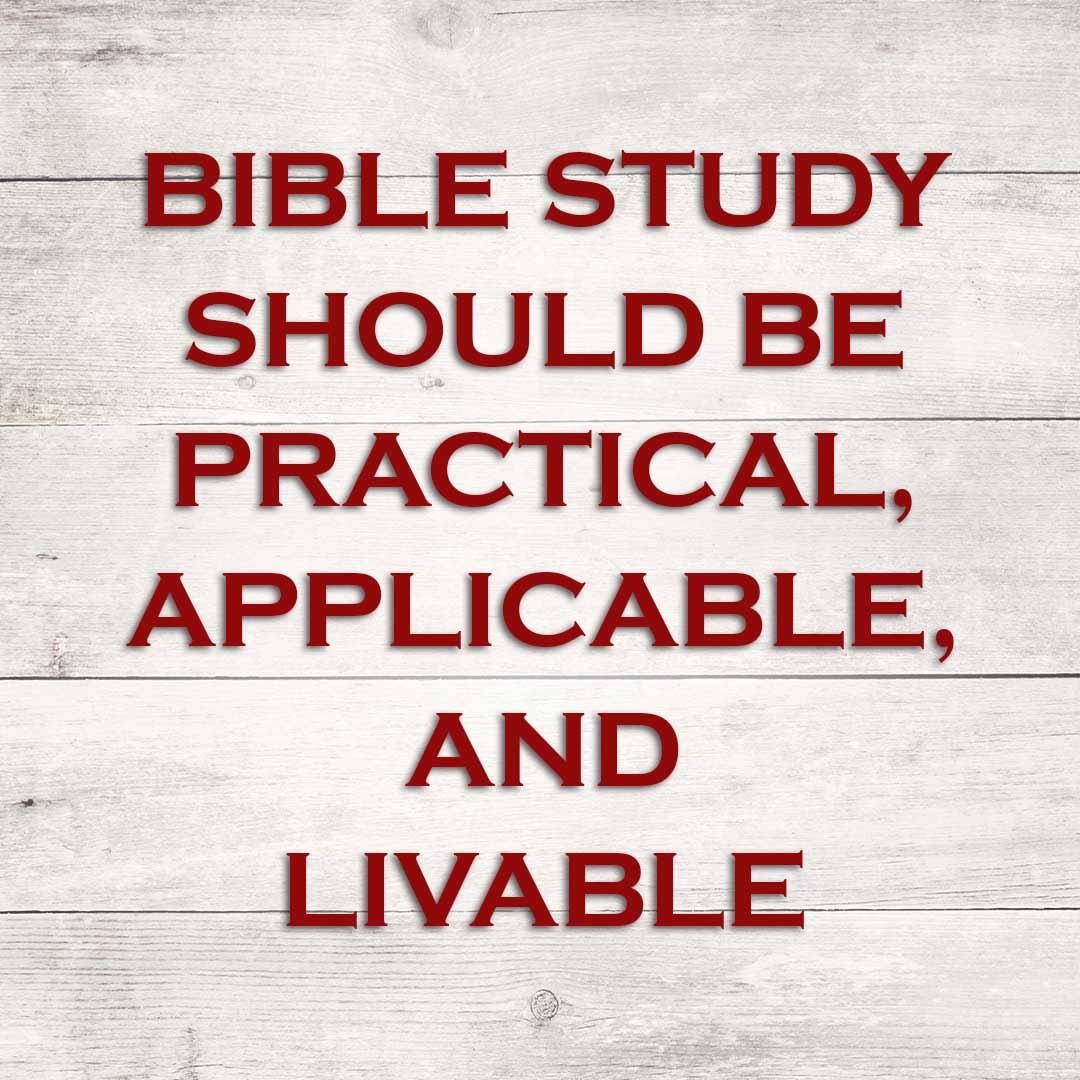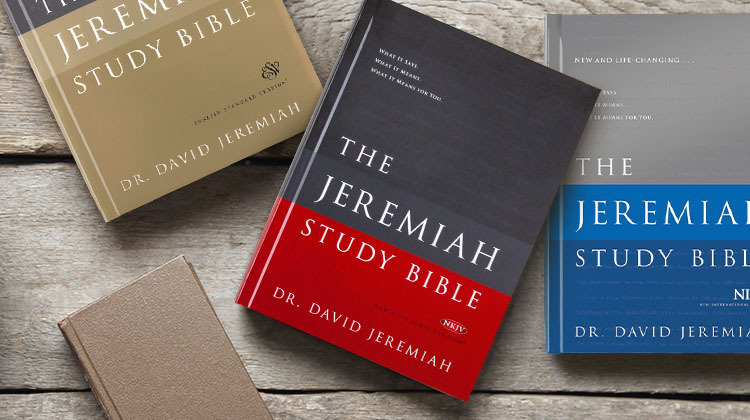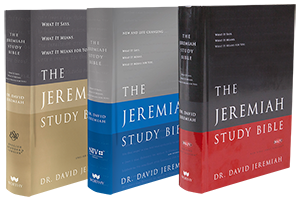Have you noticed something different about today’s Bibles? The text of Scripture has not changed, but various resources accompany the biblical text. After years of being asked to create such a study Bible, I finally felt the time was right to consolidate my life’s work into a single resource. Since 2013, The Jeremiah Study Bible has helped everyday students of the Word clearly understand what the Bible says, what it means, and what it means for them.
Paul wrote to Timothy: “Be diligent to present yourself approved to God, a worker who does not need to be ashamed, rightly dividing the word of truth” (2 Timothy 2:15, emphasis added). I love that phrase, “rightly dividing.” Paul wanted Timothy to be a student of Scripture. Timothy didn’t have a study Bible he could mark up and underline, but he was a diligent student with the tools he had.
1. What the Bible Says
The first step of Bible study is observing what the authors of Scripture wrote to their original readers. Not all of us are scholars of ancient languages, but study Bibles help us illuminate the meaning of the original Hebrew, Aramaic, and Greek texts. The more we study the fruit of Bible scholarship, the more convinced we will be of the divine authorship of Scripture.
2. What the Bible Means
Once we know what the Bible says, we move to what the Bible means in its original context. And study Bibles provide numerous notes and aids to help us bridge thousands of years of cultural change. It’s important to know what the Bible meant to its original readers before applying it to our own lives.
3. What the Bible Means for Me
Too many people begin their Bible study with personal application and invent theologies based on “what the Bible means to me.” That’s not where we start. We learn how to apply the truth of God’s Word after knowing what it says and what it means in its original context. Only then can we make an accurate application to our own life.
4. Questions to Ask as You Study the Bible
What the Bible Says – Precise Accuracy of the Word
The Bible Is an Inspired Book.
According to Hebrews 2:10, the Lord Jesus is the Captain of our salvation, guiding us with an accurate compass. As God, He is omniscient, discerning every fact in the universe. His thoughts are always just, His opinions always right, His knowledge always total. When He speaks, He makes no mistakes, wastes no words, and withholds nothing necessary for our understanding. Because He wanted to communicate with us in a permanent form we could ponder and pass on to others, He inscribed His message in a book (our word Bible comes from a Latin term for papyrus and means “book”).
God transmitted a message from His omniscient mind into this accessible book through the process of inspiration, a word that combines the prefix “in” and the term “spire,” which means “breathe.” Think of our word “respiration,” having to do with the lungs. Or the word “expire,” describing someone no longer breathing. The apostle Paul explained, “All Scripture is given by inspiration of God” (2 Timothy 3:16). In other words, God breathed it out and spoke it, just as we use our lungs to breathe out and form audible syllables. Peter further explained, “Prophecy never came by the will of man, but holy men of God spoke as they were moved by the Holy Spirit” (2 Peter 1:21).
The Spirit of God came upon particular people at certain times and guided them to write God’s message without suspending their personalities or intellects. Speaking in the Upper Room after the ascension of Christ, Peter quoted a prophecy about the betrayal of Judas Iscariot. Here’s how he put it: “Men and brethren, this Scripture had to be fulfilled, which the Holy Spirit spoke before by the mouth of David concerning Judas, who became a guide to those who arrested Jesus” (Acts 1:16, emphasis added). That’s inspiration—the Lord speaking through the mouth of David and the other writers of Scripture, and that’s why the Bible is matchless, incomparable, and different from every other book in the history of religion and literature.
A Look Inside The Jeremiah Study Bible

The Bible Is an Accurate Book.
If an omniscient God inspired the Bible, it’s logical to assume its accuracy in all it says, unfailing and infallible. Every word and syllable—every jot and tittle—is full of truth and authority. Of course, that doesn’t mean that every copy of the Bible is accurate. The London printers Robert Barker and Martin Lucas published a famous (or infamous) edition of the King James Bible in 1631. It’s called the “Wicked Bible” because the editors inadvertently omitted the word “not” from Exodus 20:14. Instead of saying, “Thou shalt not commit adultery,” the verse read, “Thou shalt commit adultery.”
Thankfully, such mistakes are rare, and we have complete confidence in the transmission and translation of God’s Word into our language. While we don’t have the original inerrant parchments or papyri written by the biblical authors, we have a remarkable chain of manuscripts going back to very early days. No book in history has the richness of manuscripts as the Bible. No other book even comes close. The original biblical documents were inerrant, infallible, and wholly accurate, for Almighty God gave them, and He makes no mistakes. Because our existing copies are so reliable and consistent, it stands out when a faulty one shows up like the “Wicked Bible.”
The Bible Is a Relevant Book.
Since the Bible is inspired and accurate, it’s always relevant. It’s more up to date than any of today’s self-help books, advice columns, theological tomes, or runaway best sellers. Because it came from the mind of the eternal God, it is timeless in its application. As we study the Bible, seeking its meaning according to sound principles of Bible study, it has a way of speaking to us about the issues we face each day.
We’ve never had so much material to read—billions of words are available online every day. It’s easy to sit down at our electronic devices and spend hours “surfing.” But too much surfing can wreck a person’s life on the rocky shoreline of deadly data. Instead, spend large portions of time studying God’s Word. It is precise and accurate in all it says. It is relevant for all our days.
God’s Word is a light for our steps, a lamp for our pathways, a plumb line for our thinking, and a sure compass for our souls.
What the Bible Means – The Proper Awareness of the Word
Have you ever given something holy to a dog or thrown a pearl in front of a pig? Or have you seen a camel that would fit through the eye of a needle? Have you seen someone shave a man’s beard half off and steal his pants?
You have likely never seen nor heard of anyone doing these things. But you have read about them in the Bible. These situations exemplify why context is crucial in understanding the Bible’s meaning.
- Dogs, pearls, and pigs. In Matthew 7:6, Jesus said not to “give what is holy to the dogs” nor “cast your pearls before swine.” To His original audiences, pearls represented the holy truths of Scripture, and Jews thought of Gentiles as dogs or pigs because both were unclean. Just as dogs and pigs cannot appreciate the value of pearls and holy things, some people are not ready to receive spiritual truth. It’s better to move on to others than to argue or debate with those who reject God’s truth.
- Camels and a needle’s eye. In Matthew 19:24 (and Mark 10:25; Luke 18:25), Jesus said, “It is easier for a camel to go through the eye of a needle than for a rich man to enter the kingdom of God.” In Jesus’ day, the camel was one of the largest animals known, and a needle’s eye was one of the smallest openings known. He was using exaggeration by way of contrast. We know of larger and smaller things in our modern world, so we could rephrase the axiom with different words and have it mean the same thing. The keyword is “easier.” No matter what items we compare, wealth often interferes with our ability to receive God’s grace.
- Half-shaving beards and stealing trousers. When the king of Ammon died and his son ascended the Ammonite throne, King David of Israel sent a delegation of men to express his sympathy to the new king on the loss of his father. Instead of being grateful for the gesture, the young Ammonite king shaved off half of David’s men’s beards and cut off their garments “in the middle, at their buttocks” (2 Samuel 10:4) and sent them back to David. David’s men “were greatly ashamed” (verse 5). For a man’s beard to be shaved half off and his body exposed was a condition of great humiliation. David allowed his men to live in seclusion until their beards regrew and ended their shame. To lift such an act out of context and apply it today would be indefensible, as would any other act of making another person feel ashamed. This was a hateful act perpetrated by a pagan king—not something to imitate.

Context Is Everything.
To understand how the original audience interpreted the Bible’s message, we must become students of context. It is not an exaggeration to say that context is everything. I encourage you to remember this principle of biblical interpretation: A text taken out of context becomes a pretext. One of the ways people can manipulate the Bible’s message is by taking biblical texts out of their original context. Those texts then become a pretext: a way to justify one’s actions while hiding the actual motivation or reason.
Here’s an example: The fifth of the Ten Commandments told Israelites to “honor your father and mother” (Exodus 20:12). By Jesus’ day, Jewish tradition allowed men to circumvent that responsibility to their parents by dedicating to God (to the temple) the money they would have used for their parents. Jesus pointed out this hypocrisy in Mark 7:10–13. They used a Jewish tradition (“dedicate your money to the temple”) as a pretext for failing to care for their parents and adhere to the fifth of the Ten Commandments.
Paul wrote, “All Scripture… is profitable” (2 Timothy 3:16). And we know that “all Scripture” was written many centuries ago. Therefore, “all Scripture” must be read contextually. As Christians, we must…
- Read Contextually. Every time you open your Bible, remember you are reading something written in a different cultural context. That means we must understand what it said then before knowing how to apply it now.
- Study Contextually. Use your study Bible to understand culturally different words, images, and meanings. Become a contextually aware student of God’s Word!
- Apply Contextually. Scripture is not only for doctrine (knowing) but for “reproof, for correction, for instruction in righteousness” (2 Timothy 3:16). The goal of Bible study is life-change through application. It is our responsibility to apply the timeless truths of Scripture properly.
- Live Contextually. The Bible does not provide a verse for every circumstance we might face in life. But the more we live in Scripture’s context, the Spirit’s presence, and Christ’s lordship, the more wisdom we will have in daily living. Those who are “in Christ” (2 Corinthians 5:17) have a new context for life—“behold, all things have become new.”

What the Bible Means for Me – The Practical Application of the Word
With Bible study, information without application is stagnation. James told his readers, “Be doers of the Word, and not hearers only, deceiving yourselves” (James 1:22). He compared the Bible to a mirror. As we gaze into the Word of God, we see ourselves reflected in it. We see our blemishes and stains. We see how we need to beautify our lives in God’s sight. Perhaps we need to apply the salve of the Spirit, the highlighting graces of faith, or the corrective lines of obedience. Some people walk away from God’s mirror without making the needed changes. “But,” said James, “he who looks into the perfect law of liberty and continues in it, and is not a forgetful hearer but a doer of the work, this one will be blessed in what he does” (verse 25).
Life application was also the theme of the Sermon on the Mount. Dismayed at the hypocrisy in His day, Jesus condemned the religionists who studied the Old Testament but never applied its message. Through His sermon in Matthew 5–7, Christ urged life-changing obedience to His words and concluded with the story of the two builders. One built a house on a rock, the other on sand. The first man’s house withstood the storm, but the house on the sand collapsed.
What was the difference? Jesus said, “Whoever hears these sayings of Mine, and does them, I will liken him to a wise man who built his house on the rock, …. But everyone who hears these sayings of Mine, and does not do them, will be like a foolish man who built his house on the sand” (Matthew 7:24, 26, emphasis added).
Both men heard the words of Jesus. Both were in His audience that day, as it were, listening admiringly to His eloquence and wisdom. Both were Bible students who heard His words. But one put the truth into practice while the other nodded politely and continued his life as usual. Their responses were as different as rock and sand. The lesson is this: It’s not enough just to be students of the Bible. We must be disciples of the Lord, which means we study His Word with a determination to put it into practice, whatever the cost.
Questions to Ask as You Study the Bible
When we study the Bible, then, whether in a group or on our own, we should always consider what it says, what it means, and what it means for us. Don’t stop at satisfying your mental curiosity. For example, many people are fascinated by the End Times, the Rapture, the Great Tribulation, and the Second Coming of Christ. I often preach and write about these things; however, God hasn’t given prophecy to satisfy our curiosity but to spur us to holy living and evangelism. Our beliefs should regulate our behavior. Knowing Christ is coming tomorrow should affect the urgency of obedience today.
Here are some questions to pose for every passage you study in the Bible:
- Is there a commandment here I need to put into practice?
- Is there a promise I need to claim?
- An attitude to adopt?
- A prayer to echo?
- A habit I should begin?
- Is there a behavior I must change?
- Is there a sin to reject?
- How can I be more Jesus-like because of these verses?
When you ask yourself those questions while studying the Bible, the Lord will reveal the answers. When you ask those questions while teaching the Bible, your listeners will understand that God did not give us the Bible to inform us but to transform us.

Each page of the Bible is a discipleship manual telling us how to live. Every passage of Scripture has one correct interpretation but many applications. We can never exhaust the impact of a Bible verse, and it will never fail to improve our conduct as we put it into practice.
Bible study should be practical, applicable, and livable. Know what the Scriptures say. Interpret God’s Word wisely, and put it into practice constantly. Always ask yourself: What does it mean for today? What does it mean for me? I’ve designed The Jeremiah Study Bible to help you answer these questions as you read God’s Word. Comprehensive in scope yet easy to understand, The Jeremiah Study Bible is a 2,200-page, one-of-a-kind study tool.
The Jeremiah Study Bible features:
- Insightful introductions to each book of the Bible
- Eight thousand study notes that I’ve derived from decades of research
- Hundreds of enriching sidebars with word studies, historical insights, and geographical and archaeological information.
- Dozens of detailed, full-page articles
- Colorful maps, charts, and table
- A thorough cross-reference system
- A topical index
- An 80-page general concordance
- The words of Jesus in red-letter print
- Easy-to-read standard or large print options
- Three translation options
You Might Also Enjoy:
• Bible Reading Plan for 2022
• 3 Ways to Read Your Bible
• 5 Forgotten Habits for Spiritual Growth

